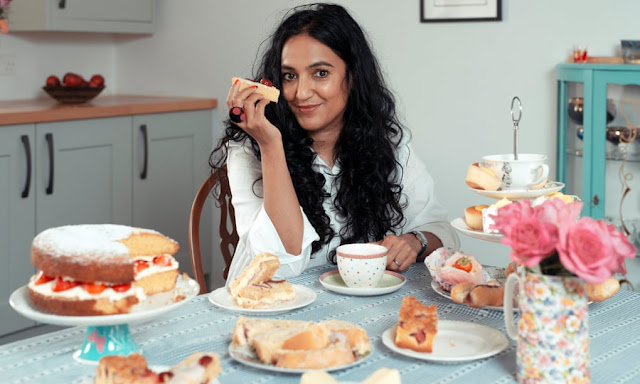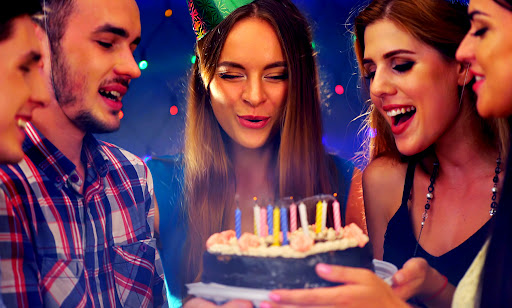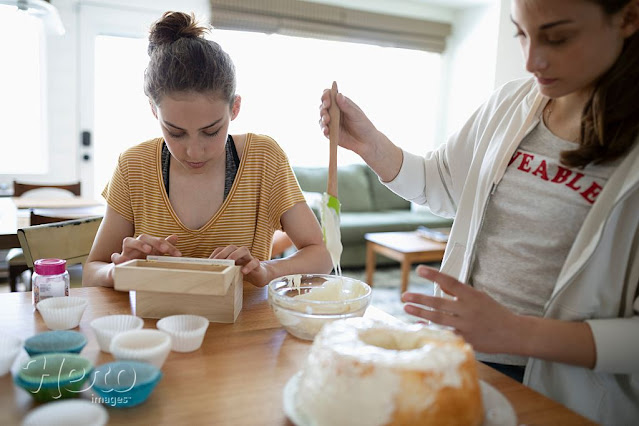Cake was my first love – it sees me through life’s highs and lows
The Great British Bake Off is back! Deals of baking utensils soar when the novice baking show is on. It seems we as a whole are cake frantic. In any case, I've been frantic 100% of the time as a crate of doughnuts for cake, well before the GBBO began. Indeed, it's one of my loves - not one of my indecencies.
Cake and I are companions; we return quite far. At school, we'd heat in home financial aspects class and sell our manifestations in the fold shop - 10p a pixie cake. The entire interaction felt like speculative chemistry to me: the creaming of spread and sugar, then, at that point, the eggs, generally beaten into a furor of enjoyment. That sensation of enchantment readily available has not left - it is the reason I love to prepare. It's a decent illustration throughout everyday life: humble beginnings can have superb closures. Like a tribute to a darling, I feel enthusiastic while expounding on it. I can smell its fragrance and its enticing impression contacting my lips.
Part of its allure for me is its rich history. Our relationship with cake returns hundreds of years. Food history specialists accept carrot cake started from carrot puddings eaten by Europeans in the medieval times, when sugar and sugars were costly and many individuals involved carrots as a substitute for sugar.
The old Egyptians cherished baking and the early Greeks were aficionados of cheesecake. The Romans, obviously, delighted in early types of nut cakes. Yet, it wasn't until the nineteenth century that the wipe cake as far as we might be concerned started to rule.
"The cake decorating was initially two bits of wipe sandwiched with simply jam," says food student of history Samantha Bilton. "The expansion of cream came in the twentieth century. Sovereign Victoria referenced her adoration for cakes much of the time in her diaries." Equally well known nowadays, is the lemon sprinkle cake, ordinarily credited to Evelyn Rose, who initially shared the formula in the Jewish Chronicle in 1967. "It has parcels making it work - light, sodden, loaded with flavor," says Lisa Smith, proprietor of Ginger Bakers, adding the insightful guidance: "In the event that it doesn't exactly work out you can constantly serve it warm with custard."
Cakes have a bit of eccentricity about them, which I revere - as though they have a place in story picture books. Maybe that is the reason they are so nostalgic for me, fragranced with youth sentiment. Before my tenth birthday celebration I went to the pastry kitchen with my mum to arrange my own. I needed the "1" to be purple and the "0" to be pink. This was vital; it was the very first chief choice I made. I have a photograph of me radiating at the cake not long before I extinguished the candles. My companions' eyes are spacey with esteem that it came in two tones.
Connected to the eccentric thought of cake is its unimportance, which is fundamental, since life is simply excessively damn genuine. Having said that, I like how destructive genuine the craft of baking can be. In Paris I visited a patisserie that blew my mind. It was tremendous and overlaid, a small scale Versaille, with roofs that were lavish and stupendous. The cakes and baked goods sat in glass drawers as though they were costly pieces of adornments. The French realize that a millefeuille can be a Monet.
Interestingly, I felt somebody was treating cake as in a serious way as I did. There was an irrefutable refinement by they way it was introduced and consumed. I had ventured into a macaron-like pastel-and gold-hued gems box. It was unadulterated sentiment. I envisioned being loosened up on a chaise longue, servers sashaying around me, conveying silver plate weighed down with pyramids of flavorful joys. This was an enchantment of the greatest quality.
Despite the fame of the GBBO, which Smith believes is the justification for why baking is so well known now for all kinds of people, there's no nutritional category we denounce more, that can cause us to have a so blameworthy outlook on consuming. Appropriately we are vociferous with regards to the morals of specific food varieties - veal and foie gras, say, however cake? A dramatization unfurls at whatever point it's offered, to such an extent that eating it can feel like a demonstration of disobedience: "Gracious, I truly shouldn't." There's an amenable dance between the provider and the taker: "Goodness, continue." And then, at that point, comes the compliant: "Alright. Simply a little cut."
We rush to work on food as "great" or "terrible". There are a lot of other sweet items out there with a high fat substance - why is cake Satan? Maybe this is on the grounds that cake is an extravagance, something we don't eat when we're really ravenous and which doesn't have any genuinely healthful importance. It is accounted for that Marie Antoinette unfeelingly said, "Let them eat cake!" when French subjects had no bread to eat. Cake exists to just fulfill want, and is in this way considered corrupt. A plate of wieners can never look scurrilous like a petit fours. Cake is loaded with ostentatiousness, cleaned up like a pro and wearing stilettos.
While following the cakes in the grocery store, an outsider murmured in my ear: "Don't, you'll get fat." My reaction? I purchased two cakes rather than one. As I stuffed my face, I contemplated the more interesting's words. Cake, to some, is an update that want should be estimated with as much precision as the fixings that go into baking one. Such a large amount our profound quality is projected on to these wonderful and palatable masterpieces. It has some way or another become representative of all that we consider human shortcoming: ravenousness, eagerness and sin. To acknowledge a cut has turned into an ethical choice.
Which is the place where I might want to present one of my legends. As well as Joan of Arc, Aunt Sally from the 80s children's show Worzel Gummidge is rousing. Auntie Sally consented to wed old Worzel to make sure she could eat wedding cake. Like me, she is proud. Her demeanor is reviving, the absolute opposite to the Hollywood divas who carry on with unbearable estimated lives. She's defective - and more fascinating for it.
For something on the shrewd rundown lasting through the year, cake emerges on our most significant days: wedding, birthday, initiating. As Bilton says: "Sovereign Victoria proclaimed: 'The dedicating cake was lovely' in her diary on 25 January 1842 while expounding on her oldest child, Bertie. So I'm speculating, by her rule, dedicating cake was unquestionably a thing."
As far as I might be concerned, cutting cake generally feels stylized, regardless of whether it's my birthday cake or a cut only for me on a blustery Monday evening. For all its
Cut of the activity: the cake lobby of acclaim
Pixie cake Its set of experiences gets from that of the cupcake, which displayed in writing toward the finish of the 1700s in American Cookery, the primary cookbook composed by an American, which portrays it as "a cake to be prepared in little cups".
Battenberg cake Also called "church window cake" and "checkerboard cake". One hypothesis of the cake's starting point is that it was made out of appreciation for the marriage of Princess Victoria to Prince Louis of Battenberg in 1884.
Espresso cake Thought to have started in Europe in the seventeenth century. Europe around then was known for its sweet-tasting yeast breads and with the coming of espresso, the formula for espresso cake advanced.
The new series of the Great British Bake Off is on Channel 4 each tuesday at 8pm.devilishness, the sharing of cake oozes love. At the point when I returned home from college my young auntie, Martha, would tempt me to visit her. "I'll heat you a cake," she'd say (code for: I love you). As I compose these words, I feel sad, on the grounds that she kicked the bucket at 36. Whenever I first heated a cake was with Aunt Martha. At the point when I consider cake, I can't resist the opportunity to think about her and being adored.
The precept, "You can't have your cake and eat it," appears to be absurd to me, a consistent deception. Why bother of cake in the event that you can't eat it? In any case, I am mindful of the more profound significance: one can't have two contrary things. However, this exactly cake is: a combination of the inconsistent. We have the joy (of eating it) and afterward the regret (in the wake of eating it). So in opposition to mainstream thinking, I am satisfied to report: you can have your cake and eat it. If it's not too much trouble, go on.




Comments
Post a Comment